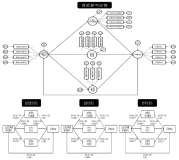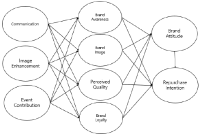
Purpose The purpose of this study was to provide title sponsorship marketing strategies by defining the relationship between professional volleyball title sponsorship, brand equity, brand attitude, and repurchase intention. Methods This study distributed 390 questionnaires to 2018-2019 V-League audiences and a total of 313 questionnaires were used as final validity sample. For data analysis, SPSS 21.0 and Amos 18.0 were used for frequency analysis, reliability analysis, confirmatory factor analysis, and structural equation analysis. Results First, title sponsorship had significant influence on brand equity, therefore hypothesis 1~3 were accepted, except for 1-3(perceived quality) and 1-4(brand loyalty). Second, among brand equity subfactors, hypothesis 4-1(brand awareness) and 4-4(brand loyalty) had significant influence on brand attitude which made hypothesis 4 partially accepted . Third, among brand equity subfactors, only brand image(hypothesis 5-2) had significant influence on repurchase intention which made hypothesis 5 partially accepted. Lastly, brand attitude had significant influence on repurchase intension, which made hypothesis 6 accepted. Conclusions It is anticipated that based on the result of the study, effective marketing strategy can be developed for title sponsorship companies in the future.

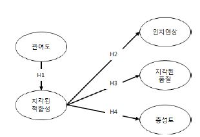
Although mega sporting events are becoming an effective means of brand communication, there has not been systematic research on involvement development and perceived fit enhancement through the sporting events. This study developed and tested a conceptual model delineating the impact of consumer involvement on perceive fit, and brand equity in mega sporting event context. Using quota sampling method, 1,847 participants (916 from IAAF; 931 from the F1) were recruited from several different cities in Korea during the mega-sporting events. Structural equation modeling were employed to examine the relationship between research constructs and test the model respectively. The study found that mega event involvement has a positive effect on perceived fit; and perceived fit influences brand equity(brand awareness, perceived quality and loyalty) toward event sponsor brands. The direct effects of involvement on sponsorship effectiveness (brand awareness, perceived quality and loyalty) did not have a significant effect on brand equity. The findings also reveal the mediating effect of perceived fit on brand equity.

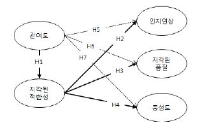
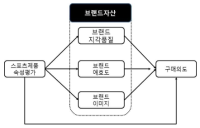
The purpose of this study was to examine competitiveness of sport product companies by brand origin in the Korean market by analyzing attribute evaluation of sport products, brand equity, and purchase intention and their causal relationship. Competitive sport brands were selected in global, Japanese, and Korean brands by a pilot survey. Then, this study selected a population participating in sports for all, elite sports, professional sports, and leisure sports and 498 effective questionnaires were secured. As a result, Korean consumers for sport products evaluated global sport brands in the highest level, Japanese sport brands in the moderate level, and Korean sport brands in the lowest level in the evaluation of attribute evaluation of sport products, brand equity, and purchase intention. Moreover, the evaluation of participating types in sports for all, elite sports, professional sports, and leisure sports showed the same result in the order of global, Japanese, and Korean sport brands. Global sport brands had a sequential causal relationship from attribute evaluation of sport products to brand equity and purchase intention and formed a consumption behavior model that attribute evaluation of sport products led to purchase intention. On the other hand, while Korean sport brands had a sequential causal relationship from attribute evaluation of sport products to brand equity and purchase intention, attribute evaluation of sport products did not lead to purchase intention. Finally, it was confirmed that global brands such as Nike and Adidas had a high market position and Korean sport consumers’ purchase behavior was determined based on information of product attributes and brand equity.

